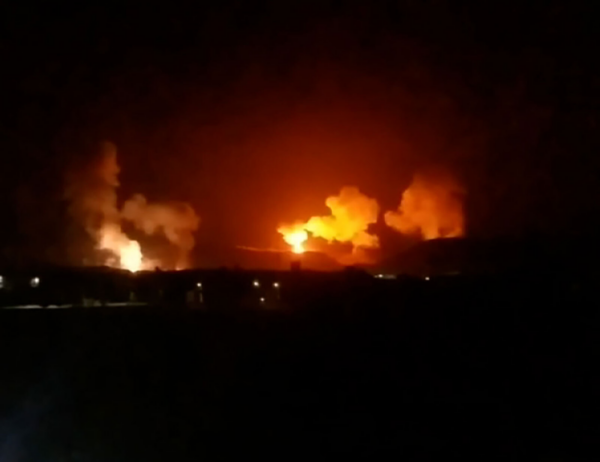A still from a video shows multiple explosions in Saada province, north of Sanaa, Yemen, on January 12, local time. From social media
US President Joe Biden said strikes by the United States and United Kingdom against Houthi-controlled areas in Yemen are “in direct response to unprecedented Houthi attacks against international maritime vessels in the Red Sea.”
“These attacks have endangered U.S. personnel, civilian mariners, and our partners, jeopardized trade, and threatened freedom of navigation,” the president said in a statement Thursday.
He said the strikes were carried out by the US and the UK with support from Australia, Bahrain, Canada, and the Netherlands, according to the statement.
Biden said the attacks by Houthi rebels in the Red Sea have had a wide impact, affecting commercial shipping from more than 50 countries.
The Houthi attacks on Red Sea shipping on Tuesday marked the final straw for US President Joe Biden giving the green light to the US to move forward with what culminated in the attacks tonight against the Houthis in Yemen, though preparations have been ongoing for some time, a senior US official told CNN.
On Tuesday, the US Navy shot down 21 Houthi missiles and drones launched from Yemen, according to a statement from US Central Command, in one of the largest Houthi attacks to take place in the Red Sea in recent months.
The official said Thursday night that US vessels were among the targets on Tuesday.
There were no ships damaged in the attacks and no injuries as a result of the massive drone and missile launch, CENTCOM said.
Who are the Houthis?
The Houthi movement, also known as Ansarallah (Supporters of God), is one side of the Yemeni civil war that has raged for nearly a decade. It emerged in the 1990s, when its leader, Hussein al-Houthi, launched “Believing Youth,” a religious revival movement for a centuries-old subsect of Shia Islam called Zaidism. The Zaidis ruled Yemen for centuries but were marginalized under the Sunni regime that came to power after the 1962 civil war. Al-Houthi’s movement was founded to represent Zaidis and resist radical Sunnism, particularly Wahhabi ideas from Saudi Arabia. His closest followers became known as Houthis.
How did they gain power?
Ali Abdullah Saleh, the first president of Yemen after the 1990 unification of North and South Yemen, initially supported the Believing Youth. But as the movement’s popularity grew and anti-government rhetoric sharpened, it became a threat to Saleh. Things came to a head in 2003, when Saleh supported the United States invasion of Iraq, which many Yemenis opposed. For al-Houthi, the rift was an opportunity. Seizing on the public outrage, he organized mass demonstrations. After months of disorder, Saleh issued a warrant for his arrest. Al-Houthi was killed in September 2004 by Yemeni forces, but his movement lived on. The Houthi military wing grew as more fighters joined the cause. Emboldened by the early Arab Spring protests in 2011, they took control of the northern province of Saada and called for the end of the Saleh regime.
Why are the Houthis attacking ships in the Red Sea?
While, through a combination of geography and technology, the Houthis may lack the capabilities of Hamas and Hezbollah, their strikes on commercial vessels in the Red Sea may inflict a different sort of pain on Israel and its allies. The attacks could force ships to take a far longer route around Africa and cause insurance costs to rocket. Companies could pass on the increased cost of moving their goods to consumers, raising prices again at a time when governments around the world have struggled to tame post-pandemic inflation. The Houthi strikes could be intended to inflict economic pain on Israel’s allies in the hope they will pressure it to cease its bombardment of the enclave. Championing the Palestinian cause could also be an attempt to gain legitimacy at home and in the region as they seek to control northern Yemen. It could also give them an upper hand against their Arab adversaries, Saudi Arabia and the United Arab Emirates, who they accuse of being lackeys of the US and Israel.
CNN


Leave a Reply
You must be logged in to post a comment.